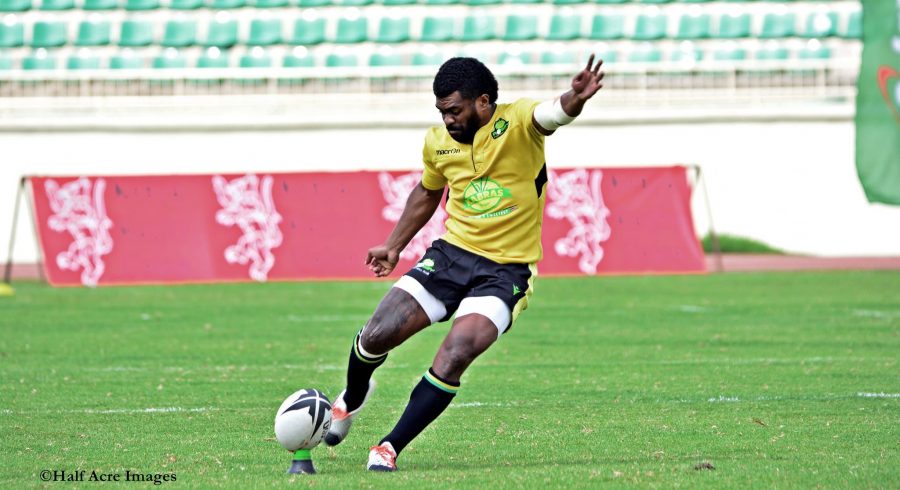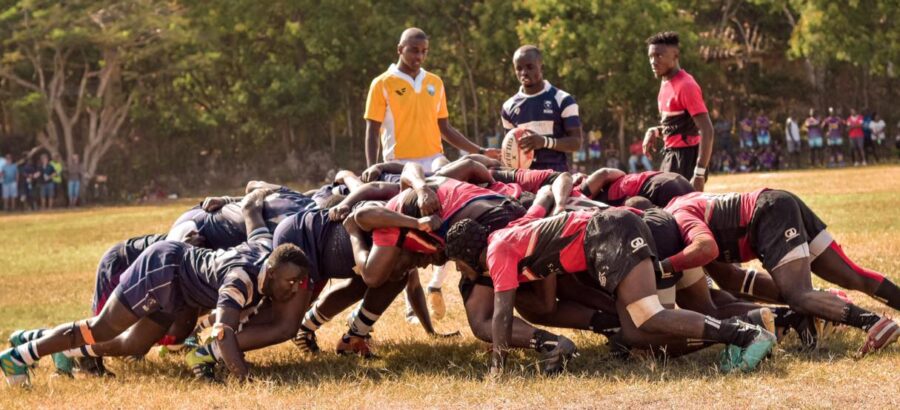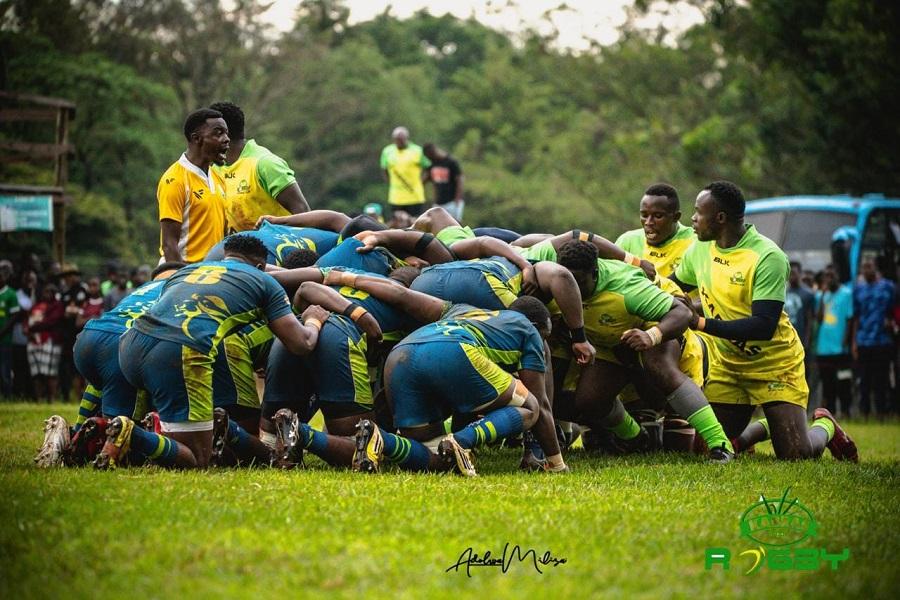Kenya Rugby through the training and education department has released updates to the World Rugby laws and guidelines that will affect the Kenya Cup, Championship, and grassroots leagues.
The changes shared with Kenyan Clubs team managers are intended to enhance player safety, increase game speed, and improve the overall flow of play, with an emphasis on responsibility and discipline for both players and officials.
Kenya Rugby’s updates largely build on the foundational principles from the previous season, focusing on speeding up the game, eliminating negative player actions, and enforcing stricter safety measures.
Conversion and penalty time limits
Conversions: Players now have 90 seconds (playing time) to take the conversion kick after a try is awarded. If the kicker exceeds this timeframe, the conversion attempt is forfeited, and no points will be added. This change ensures that the game proceeds smoothly after scoring events, avoiding long pauses.

Kabras’ Jone Kubu takes a kick in a past match . PHOTO/Denis Acre-Half.
Penalty kicks: Penalty kicks must be completed within 60 seconds (playing time) of signaling the intention to kick. Failing to meet this limit results in the kick being disallowed, and a scrum will be awarded to the opposing team at the location of the infringement.
Set Piece Speed: To maintain a fast-paced rhythm, new rules require teams to form set pieces like lineouts and scrums promptly. Lineouts must form without delay, and scrums must be ready to form within 30 seconds of the mark being set. Any delays in these areas will result in free kicks awarded to the opposing team.
Anti-Time-Wasting Measures: Players must avoid unnecessary delays by holding or walking off with the ball at penalties, which limits offensive options and hinders the game’s flow. Officials have been instructed to enforce these rules strictly, with time-wasting infractions penalized by free-kicks to discourage this behaviour across all game levels.
EDITOR’S PICKS:
- Follow us on Scrummage Africa FB
- Mike Friday advice to Kenya 7s
- Kanyanya’s transition from rugby pitch to police beat
- 1 step forward, 2 back: A story of Kenya Rugby Referees
The revised laws introduce new expectations for players’ actions, targeting behaviour that compromises game integrity and safety:
Negative Player Action: Officials will address tactics such as trapping players into the ruck or exploiting positional advantages unfairly, including the “jackler” (first arriving player) who should focus on contesting the ball rather than impeding opponents. This adjustment allows smoother, more contestable ruck play and fair competition.
“On Feet” vs. “Off Feet” Definitions
Players at the tackle, ruck, and maul must remain on their feet unless they are momentarily balancing themselves, which officials will monitor closely. This clarification emphasizes the need for stability and control, deterring players from exploiting ground-level play.
On feet: Players are on their feet as long as no body part other than their feet is in contact with the ground.
Off feet: Players are off their feet if they use any part of their body to support themselves other than their feet, which can result in a penalty in ruck situations.
Intentional knock-on clarification
Referees will look for evidence that players have a reasonable chance of catching the ball when attempting to intercept. This update seeks to resolve debates around what qualifies as a deliberate knock-on, which will now more likely be penalized when intent to catch the ball is absent. While yellow cards may still apply in specific instances, referees are encouraged to use judgment rather than a strict formula.
The Crocodile roll ban
One of the most significant changes is the prohibition of the “crocodile roll,” a manoeuvre where a player rolls or twists an opponent off the ball, often impacting the lower limbs and creating serious injury risks. The updated laws now dictate:
New Law 9.20d: Players are no longer allowed to roll or twist an opponent to the ground. Instead, they can only drive the jackler backwards, ensuring the player stays balanced without excessive force on their legs. Violations will result in penalties to protect players from dangerous challenges.
Additional Tackle Rules: In alignment with player safety, a new guideline under tackle law prohibits any rolling, pulling, or twisting in the tackle area. This shift in approach encourages more upright, stable play and deters dangerous wrestling-like manoeuvres.
Adjustments to water carriers and medical access
To control stoppages for hydration, water carriers are now limited to entering the field only at specific times:
After a try is scored, water carriers for the scoring team can assist players at or near the 10-meter line in their half. For the non-scoring team, water carriers are restricted to their in-goal area or behind the dead-ball line.
Water carriers are only allowed during natural game stoppages if no tries are scored within the initial 15-20 minutes.
Medics may continue to attend to injured players at any time but are only permitted to provide water to the player they are treating. This adjustment prioritizes player welfare while reducing time-wasting by preventing unnecessary water breaks.
Scrum Options and the Introduction of the Brake Foot
To facilitate quick and safe scrums, new stability measures require hookers to adopt a “brake foot” stance throughout the scrum engagement.
Brake Foot Position: The hooker’s foot must remain forward in the middle of the tunnel to prevent axial loading, only adjusting after the “Set” call and prior to striking for the ball. This change provides added stability and prevents collapses, making scrums safer and more efficient.

Scrum contest between South Coast Pirates vs Shamas Foundation. Photo/Pirates.
Caterpillar ruck law update:
Use-It Call at Ruck: Once the ball is clearly won and available to be played at a ruck, the referee will now call “use it.” Teams must then play the ball from the ruck within five seconds of this call.
Sanction: If the team fails to play the ball within the time limit, a scrum is awarded to the opposing team.
Definition of “Played”: The ball is considered “played” when intentionally touched by a player. If a player uses their foot to bring the ball to the back of the ruck, this meets the requirement for the ball to be considered “played.”
Teams awarded free kicks no longer have the option to choose a scrum, an adjustment intended to minimize set-piece restarts and accelerate game flow.



